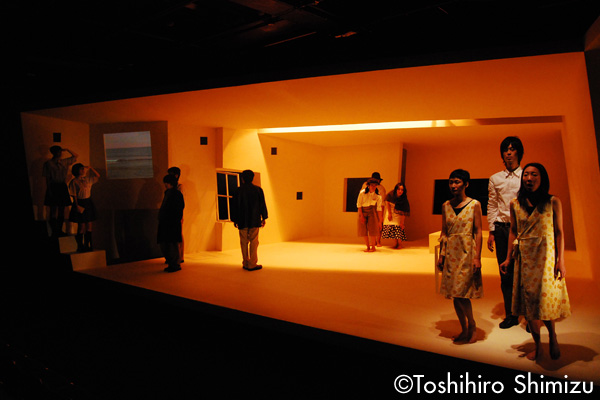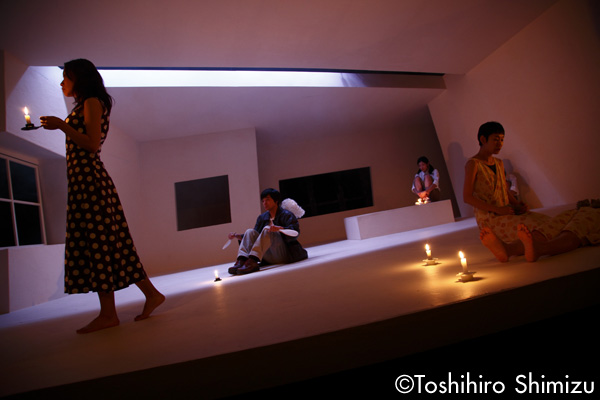The set is horizontally wide room with a low ceiling and everything painted pure-white. The room has three windows of different sizes. To one side in the lower front is a staircase with a few steps, and above the stairs is a screen on which scenes of the sea and beach and interviews with the islanders appear during the course of the play.
On the screen we see a script and the hand writing it. The man narrating tells us that beyond the large window is a man he names Iki who is on the verge of death, and that he is trying to record every detail of that death. On the screen we see the hand written down the contents he relates, as he narrates.
Iki’s wife visits the local boat builder from time to time and launches into unsolicited discourses on what happens to people when they die. The boat builder goes about his work without responding.
At the island’s ferry landing, a man who has just returned home to the island and one of the islanders [hereafter the Islander] are talking. Unprompted, the Islander begins to speak about his love for Iki’s wife to the man who has returned to the island [hereafter the Returnee] in order to visit his grandparents’ grave.
A brother and sister have landed on a beach of the island after a voyage as stowaways. The sister has a rare disease that causes a strong shivering deep in her body. Unable to prove their identity, the brother and sister are wondering if they can use this disease in some kind of business to make a living. Listening to the brother and sister’s conversation, we realize that they know the Islander who loves Iki’s wife wants to murder the boat builder she always visits.
On a vantage point overlooking the island (the staircase) are two angels dressed in high school girls’ uniforms. They are talking as they read and their manner of speech is just like today’s high school girls. When their eyes meet the narrator they say “
Kimo
!” (Disgusting!) in high school girl slang.
There follow a number of short scenes involving encounters between the islanders and visitors to the island. There is a scene of a family reading a letter washed up on the beach in a bottle, another of the Returnee dancing with the Islander, a scene of two woman divers who sell clams, one of the angels talking about movies and another telling of a letter that Iki wrote to the stowaway brother. On the screen we see scenes from around the island and of a minister and others walking on the beach picking up shells.
While talking to the stowaway sister, the Returnee remembers that he was a movie director who has never yet made a movie. A film crew arrives at the island and filming of a movie begins. Suddenly the Islander has become a movie director. Without knowing what the movie will be, the director [the Islander] begins taking footage of the women divers, Iki’s wife and the stowaway brother and sister. Although the movie still has no story or plan, he films interviews and scenes one after another. In the meantime, one of the angels leaves the island to begin looking for a job.
There is a break in the filming. The people light candles and each begins talking about their feelings and episodes that remain in their memories.
The distorted shadows of the people produced by the candlelight create an otherworldly atmosphere on the stage. As the strange tales continue, the Islander finds a harpoon placed aimlessly on the filming site and spurred by this coincidence and his long-held jealousy, he decides to kill the boat builder.
From the radio that the Islander has brought, an upbeat popular tune is playing. As the music resonates around the entire stage, everyone begins dancing, and in the midst of this clamor of motion the Islander slays the boat builder.
At that moment Iki’s breathing stops. Just as it appears that Iki is going to die, one of the diver women says, “A person can hold one’s breath for five minutes,” and begins to hold her breath. Five minutes later, still holding her breath, the diver dies. And, at that same instant, Iki’s breath returns. The islanders praise the diver as a saint who has sacrificed herself for Iki and erect monument over her grave.
As Iki lives on, strange exchanges continue to occur on the island. Having each lost their other half, the remaining angel and diver woman talk together about movies, and people who have supposedly died reappear and pass on.
Suddenly, the scene shifts to outside the island. Having failed to find a job, the angel that left the island has ended up in Tokyo and no longer has any memory that she was once an angel. Now she is working as an assistant with a theater company and we find her at a convenience store making copies on the copy machine. We see the flashes of the copy machine light scans. And, in between the intervals of light scans come glimpses of the island and its people appearing like scenes from the world after death.




